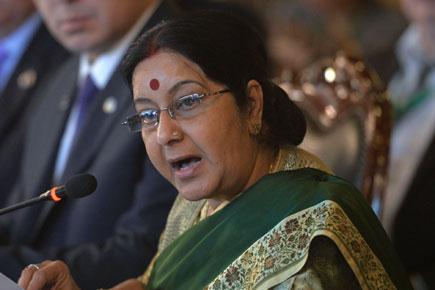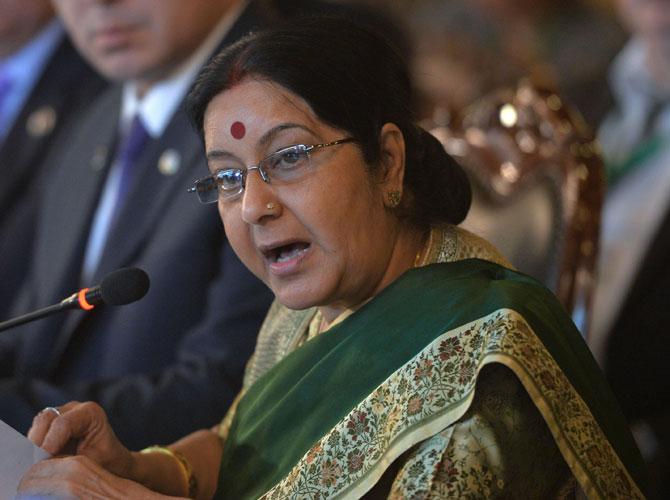India today said Pakistan has not refused to allow an NIA team to visit that country to probe the Pathankot airbase attack case and just sought "more time" even as it made it clear that talks and teror cannot go hand-in-hand

New Delhi: India today said Pakistan has not refused to allow an NIA team to visit that country to probe the Pathankot airbase attack case and just sought "more time" even as it made it clear that talks and teror cannot go hand-in-hand.
ADVERTISEMENT

Sushma Swaraj
External Affairs Minister Sushma Swaraj also said the "warmth and ease" in relationship between Prime Minister Narendra Modi and his Pakistani counterpart Nawaz Sharif can help resolve complex issues between the two neighbours.
Asserting that India wants to resolve all vexed issues with Pakistan through talks, Swaraj said the government was pursuing a three-point formula to deal with Islamabad the focus of which is that talks cannot go on if Pakistan does not take action to contain terror.
"First, we want to solve every issue thorough talks. Second, talks will be between India and Pakistan and no third country or party will be its part. Third, terror and talks will not go hand-in-hand," Swaraj said addressing a press conference.
Swaraj said there have been complex issues between the two countries and it would not be practical to expect their resolution soon.
"After Pathankot attack, there were expectations from government and people that there should be some concrete steps from their side. This expectation is not unreasonable. So we are waiting for concrete steps from their side," she said.
The External Affairs Minister said Pakistan has not refused to allow a team of NIA to visit that country to carry forward the probe into the Pathankot terror attack case and that it is just seeking "more time" to examine the evidence.
A five-member Joint Investigation Team (JIT) from Pakistan had visited India between March 27 and 31 to collect evidence with regard to the attack. India has been maintaining that since JIT's visit was on a reciprocal basis, the NIA team investigating the case would like to visit Pakistan.
Swaraj said the Indian High Commissioner in Islamabad had met the authorites on the issue twice and "they said they are analysing (the evidence). They have not refused (to allow NIA to visit). They just said they want more time."
The External Affairs Minister said Foreign Secretary level talks between the two countries have not been called off. "Neither from our side it has been called off nor from their side," she said.
Insisting that there was a "huge difference" between Pakistan's response to the Pathankot attack and its reaction following terror strikes in the past, Swaraj said the "ease and warmth" of relationship between Modi and Sharif may help find solution to complex problems.
At the same time she added, "It is not that because of the warmth in relationship we will take things lightly and will not remain alert."
Swaraj refered to Modi's unannounced visit to lahore in December last year and Sharif's phone call to the Indian Prime Minister a day ahead of the latter's heart surgery in London last month to highlight the warmth in relationship between the two leaders.
"It is true that there are difficult issues between the two countries. Issues like the UN resolution on Kashmir as referred by you.
"It is impractical to expect their resolution soon or after two-three rounds of talks. But to resolve issues, you need to have relationship. I would like to say there is an ease and warmth in relationshiop between the two prime ministers," she said replying to a question on India's ties with Pakistan.
She said Pakistan used to be in a "denial mode" after terror attacks in India but its attitude after Pathankot assault was totally different.
"It happened for the first time that their Prime Minister Nawaz Sharif called up our Prime Mimnister and said 'you give me evidence, I will definitely act on it. It is a huge difference," said Swaraj.
She said there are forces which do not want good relations between the two PMs and better ties between the two neighbours.
Talking about terror, Swaraj pressed for an early adoption of the long-pending Comprehensive Convention on International Terrorism (CCIT), noting that it will help tackle the menace of terrorism.
She said so many countries including those in the Gulf region have recognised the need for having a uniform approach to dealing with terrorists. She also referred to China recently blocking India's bid for putting Masood Azhar on the UN list of proscribed terrorists and said there should be no distinction between good and bad terrorists.
 Subscribe today by clicking the link and stay updated with the latest news!" Click here!
Subscribe today by clicking the link and stay updated with the latest news!" Click here!






